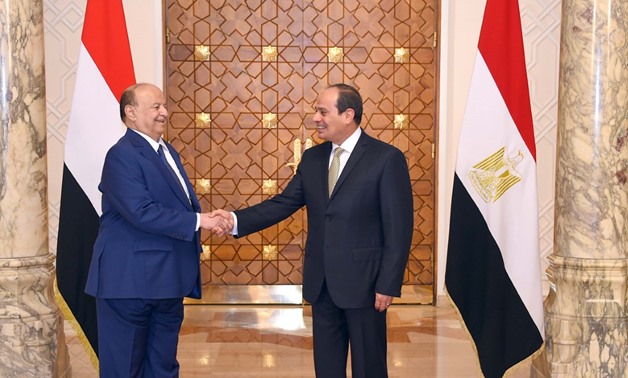
President Abdel Fatah al-Sisi and Yemeni President Abd-Rabbu Mansour Hadi Aug. 13, 2018 - Press photo
CAIRO – 13 August 2018: Egypt and Yemen have strong historical bonds; since Yemeni crisis erupted in 2011, Egypt, as a member of the Arab Coalition, has supported the legitimate government in Yemen and scores of refugees.
Yemeni President Abd-Rabbu Mansour Hadi’s visit to Cairo on Monday sheds light on strong Egyptian-Yemeni bilateral ties in different fields.
Yemeni Foreign Minister Khaled al-Yamani said that Hadi will express his thanks to President Sisi for housing many Yemeni refugees amid the difficult circumstances Egypt faces.
He added that Hadi will discuss the situation in Yemen during his meeting with Sisi, confirming that Egypt supports Yemeni people and is interested in ending Houthi attacks against Saudi Arabia and combating Iran’s regional attempts.
This will be Hadi’s third visit to visit Egypt since took office; he previously visited Sharm El- Sheikh to participate in the March 2015 Arab Summit and attended the new Suez Canal inauguration in August 2015.
Egypt’s role in Yemeni crisis
Egypt has long expressed its deep concern about the serious escalation of situation in Yemen leading to the execution of former Yemeni President Ali Abdullah Saleh at the hands of Houthi militias.
Egypt supported Yemen’s GCC power transfer deal signed in 2011 in Riyadh, Saudi Arabia, for former President Ali Abdullah Saleh handing over power to his deputy Abd-Rabbu Mansour Hadi.
During the Arab Summit held in Sharm el-Sheikh in March 2015, Egypt backed the Saudi-led Operation Decisive Storm against Houthi fighters in Iran-backed Houthis, a move backing Yemeni legitimacy.
“Egypt has declared its political and military support, its participation with the coalition with an aerial and naval Egyptian force, as well as a ground force if necessary, in light of Egypt’s historic and unshakeable responsibility towards Arab and Gulf national security,” Egyptian foreign minister Sameh Shoukry told a meeting of Arab foreign ministers in Sharm el-Sheikh.
As a part of its participation in Operation Decisive Storm, the Egyptian naval forced Iranian warships to retreat from the Bab al Mandeb strait in March 2015.
Additionally, the Egyptian National Defense agreed in January 2017 to extend the participation of required elementsfrom the Armed Forces in a combat operation outside the nation's border to defend Egyptian and Arab national security in the Gulf, Red Sea, and Bab al-Mandeb.
As for housing Yemeni refugees, Egypt has received 6,810 Yemeni refugees, according to the UN Refugee Agency. The most populous Arab country also rejects the idea of refugee camps and allows refugees to access to all Egyptian services.
In July 2018, Egypt’s Ministry of Education declared that Syrians and Yemenis are not required to pay the high fees imposed on other foreign nationals due to the hardships they have faced amid ongoing civil wars.
Economic relations between Egypt and Yemen have improved in the recent period upon directions from President Sisi and in solidarity with the Yemeni people. Egypt has sent humanitarian aid, including medicine, vaccines and medical equipment since April 2018.
The volume of trade exchange between Egypt and Yemen during 2011 reached $250 million.

Comments
Leave a Comment